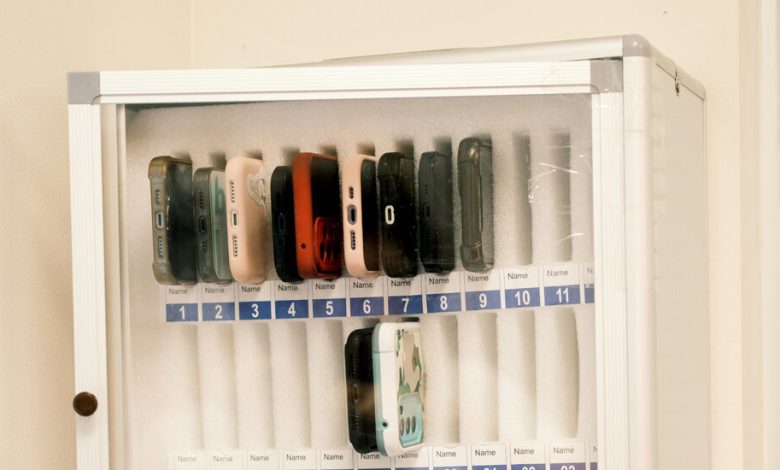When Students’ Cellphones ‘Colonize Their Minds’

More from our inbox:
- The ‘Catastrophists’ vs. American Democracy
- Compassion Prevails. ‘How Refreshing.’

Credit…Zack Wittman for The New York Times
To the Editor:
Re “Kids Aren’t the Ones With the Cellphone Problem,” by Pamela Paul (column, Nov. 10):
How ironic for Ms. Paul to suggest that we can “teach kids to be safe, responsible and independent” by taking away their access to a device that so many of their parents cling to throughout their days.
It makes sense for schools to ban cellphone use during classroom time, as many already do, but how does removing access to cellphones outside the classroom benefit students?
If schools really want to teach kids to be responsible and independent, they should have discussions with their students about which restrictions on their cellphone use can be beneficial academically, socially or personally, and which are unnecessary, or even counterproductive.
Keith Holzmueller
Evanston, Ill.
To the Editor:
Try teaching a student whose boyfriend broke up with her via text between classes.
Try assisting one student during a test while another behind you is photographing the test.
Try banning phones in schools when it’s the mothers who constantly call during classes.
Try finding teachers who care enough not to quit after eight years.
And so it goes …
Victoria Croul
Exton, Pa.
The writer is a former teacher of both high school and college students.
To the Editor:
Re “A Florida District Bans Phones. Students Agonize but Perk Up” (front page, Nov. 1):
During my 15 years as an English teacher — basking in teenagers’ moods, wit and sometimes even joy — I learned that their phones, even if “put away” in a book bag in class, continued to colonize their minds.
Silently, they fretted over whether a parent had seen their frantic message and was on the way with forgotten homework, whether a BFF had left a consoling text, whether questions for the last-period exam had been sent by a fellow cheater, what grades had been updated and (especially if you were a girl) what names you’d been called.
Cellphones pull as hard as magnets, and seem to vibrate with expectancy when you merely look at them or have one in your book bag.
Over my teaching years, as cellphones became smartphones (with so many more enticing features), I still put to work the most compelling lesson plans I could dream up — even as, increasingly, the inner distractions glazed my kids’ eyes, which were also drooping with screen-induced sleep deprivation. (And who wants to try to engage a group like that? No wonder we have a teacher shortage.)
Used to be, when my teenagers packed their satchels to troop toward the door — after, say, an hour of Shakespeare — some of the kids might still be thinking about him, or complaining about him, or asking me about him, or chattering about “Hamlet” among themselves or mouthing “To be or not to be!”
Nowadays, they’re all on their phones.
Marc Vincenti
Palo Alto, Calif.
To the Editor:
I commend the Orange County school district for its proactive approach in enforcing a “no phones” policy.
As a physician and filmmaker of “The Screenagers Trilogy,” I have been championing the removal of phones from schools since 2017, when I launched the “Away for the Day” campaign to stop phone use in schools.
Research has shown that depression and anxiety increase and grades go down when phones are accessible during school time.
Last month, my team and I released the results of a survey we did of nearly 300 high school students. A whopping two-thirds of them said that middle school students should not have access to phones while in class, and more than a third of them said the same for high school students.
We also know that kids become more engaged with teachers and their peers when they don’t have access to phones, as pointed out in your article. No phones during school creates more brain space for engaging socially and academically.
Thank you to Orange County for taking such an important step. I truly hope more schools and school districts follow its lead and take action to keep phones away for the day.
Delaney Ruston
Seattle
The ‘Catastrophists’ vs. American Democracy
To the Editor:
Re “The Conservatives Who Help Explain Republican Extremism,” by Damon Linker (Opinion guest essay, Nov. 5):
Mr. Linker’s disturbing article illuminating the breathtakingly arrogant, repressive, narrowly held beliefs of several conservative “catastrophists” is a wake-up call to any man or woman who treasures diversity and democracy.
As I read the article, the echoes of the tyrannical thought-constructs of Vladimir Putin struck me with terrifying clarity. These “thinkers” simply feel that their beliefs and their desired hold on power are appropriate because they are better than “others.”
The “others” are a diverse lot: women, liberals, people branded as decadent threats, immigrants, racial minorities and non-Christians (at least not their version of Christianity).
Gentlemen, the genius of our fragile democracy is our rich social, religious and cultural diversity, truly unique in the world. That democracy is threatening precisely because people choose their religious, educational and cultural paths in a free society not narrowly constructed and controlled by those who think they are superior and know best.
We don’t want a tyrant, we don’t want a Caesar, and we don’t want an American version of Vladimir Putin or Viktor Orban controlling us.
Sally Peabody
Peabody, Mass.
To the Editor:
Damon Linker presents the ideas of a fascinating group of thinkers who see our liberal feminist society as driving us to destruction and in need of a Christian theocracy, brought about through intrigue and deceit, to set us straight. And not just any Christianity, but a messianic one that sees opponents, and reason, as ultimate enemies to be eliminated.
These intellectuals’ writings are fascinating like “The Lord of the Rings” or “A Game of Thrones,” best kept in the fantasy and mayhem genre sections of our libraries.
They take a distorted bunch of historical dots and connect them with magical depraved swirls. And yet some take them literally. Who would have thought?
Steve Davidson
Georgetown, Texas
The writer is a retired professor of history.
Compassion Prevails. ‘How Refreshing.’
To the Editor:
Re “In Texas, Fight Over School Theater Takes an Unexpected Turn” (news article, Nov. 16):
Hateful comments seem to be everywhere.
Donald Trump referred to opponents as “vermin”; Israel’s now suspended heritage minister, Amichay Eliyahu, advocated the option of using atomic weapons in Gaza; Britain’s former home secretary, Suella Braverman, referred to homelessness as a “lifestyle choice.”
Therefore, how refreshing it was to read how the school board in Sherman, Texas, unanimously restored the original casting of “Oklahoma!” to include transgender students and those who were portraying characters who did not conform to their gender identity.
For once, common sense and compassion in a conservative town prevails. It is absolutely wonderful to see the students succeed as they now begin to add the finishing touches to their production with the original cast.
Larry Vigon
Chicago



